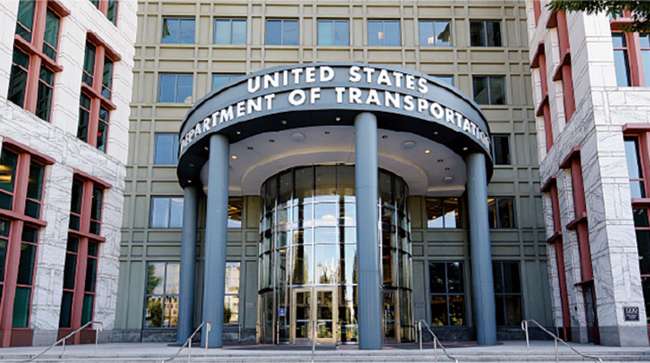Though FMCSA issues federal emergency declarations, most hours-of-service exemptions are granted after a disaster has occurred. (USDOT via Facebook)
Thirty-three members of Congress from 22 states are asking the Federal Motor Carrier Safety Administration to issue hours-of-service exemptions when emergency warnings are issued instead of waiting until after disaster strikes.
U.S. Reps. Mike Bost (R-Ill.) and Mike Collins (R-Ga.) are spearheading the request in a June 10 letter to Sue Lawless, FMCSA executive director and chief safety officer.
“When communities are staring down the threat of a dangerous emergency, the last thing they should have to worry about is ready access to fuel for their homes and vehicles,” Bost said. “I grew up in a family trucking business; I know red tape and delays at the federal level often make it harder for truckers to do their jobs and deliver their product when it matters most. This common-sense policy change will help keep families safe and spur a quicker recovery during severe weather and supply chain disruptions.”
The lawmakers, all Republicans, want FMCSA to establish a “pre-emptive and proactive policy” about HOS before major disasters/emergencies and also in regional emergencies.
Though FMCSA issues federal emergency declarations, most HOS exemptions are granted after a disaster has occurred. This reactive approach can result in confusion and delays delivering critical supplies.

Reps. Mike Bost (R-Ill.), left, and Rep. Mike Collins (R-Ga.)
FMCSA on July 7 issued an extended emergency declaration through Aug. 4 for Texas. The emergency conditions there necessitated immediate transportation to restore essential supplies and services due to historic flooding July 4 in the central part of the state, killing more than 100 people with over 150 missing. The agency waived 49 Code of Federal Regulations Parts 390-399 for commercial motor vehicles providing direct assistance supporting emergency relief efforts.
“When disaster strikes, our fueling stations need to be supplied and ready to provide first responders and everyone in the impacted zone with the power they need to recover and rebuild,” Collins said. “I am proud to join my colleagues in improving disaster response and getting government bureaucracy out of the way of common-sense solutions.”
In particular, the lawmakers discussed how such a policy would help truckers and fuel marketers “navigate complex conditions –– such as increased fuel demand, road closures, challenging travel routes, longer fuel pickup distances and extended wait times at terminals –– while ensuring safe and reliable fuel delivery.”
“To enhance state and regional preparedness and recovery efforts, a pre-emptive and proactive HOS exemptions policy is imperative for the immediate restoration of essential services and supplies in interstate commerce,” the four-page letter stated.
Pennsylvania had five representatives sign the letter, and Michigan had three. On July 7, the U.S. Department of Agriculture designated 15 counties in Michigan as natural disaster areas due to extreme weather from 2024 through this year arising from cold temperature frosts and freezes, droughts and excessive rainstorms.
Five states — Arkansas, Idaho, Kentucky, North Carolina and Texas — each had two members of their congressional delegations reach out to FMCSA with the request.
Other states represented in the request were Arizona, Colorado, Florida, Indiana, Kansas, Minnesota, Nebraska, New York, Ohio, Oregon, South Carolina, Tennessee and Virginia.
In North Carolina, for instance, state officials from different agencies like the transportation department continue to issue progress reports on their recovery efforts to open roads after the devastation wrought by Hurricane Helene last September.
Three experts from Transport Enterprise Leasing discuss strategies for buying and selling trucks amid regulatory shifts, trade tensions and economic uncertainty. Tune in above or by going to RoadSigns.ttnews.com.
The members of Congress asked FMCSA to:
• Develop internal guidance to automatically issue federal emergency declarations with HOS waivers for motor carriers at least five days before a reliably predicted disaster or emergency strikes.
• Implement agency policy on automatic regional relief to better unify responses to disasters and emergencies.
“Having only state-level regulatory relief in response to state and local emergency declarations often creates an uneven regulatory environment and confusion and delay in regional responses to emergencies and disasters, particularly for multistate suppliers and retailers,” the letter stated. “A uniform federal approach to regional emergencies is essential to prevent confusion and compliance challenges caused by the piecemeal adoption of state emergency declarations with varying conditions (e.g., heating fuels covered in one state but not in another, and different start and end dates).”
The lawmakers urged FMCSA to proactively address interstate commerce logistical challenges that arise from disaster events.
If FMCSA establishes clear internal guidance on issuing HOS for regional relief, such a policy would “eliminate confusion when drivers must rely on multiple declarations to transport fuel across state lines,” they predicted. “Clarity and consistency will enable drivers to make the best route decisions for the efficient restoration of essential fuel supplies.”







